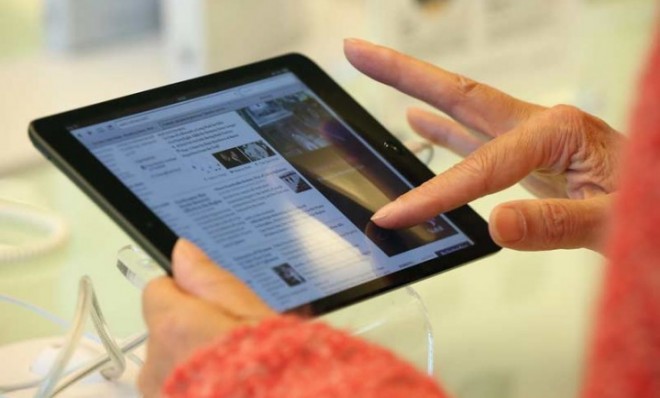Why Apple is making an expensive 128GB iPad
Who wants a tablet for $800? The answer may have something to do with Steve Jobs' hurt feelings

A free daily email with the biggest news stories of the day – and the best features from TheWeek.com
You are now subscribed
Your newsletter sign-up was successful
Everyone knows Steve Jobs was a sensitive guy. Impetuous and stubborn, too, but the right people could change his mind if they truly knew what they were talking about. One of the criticisms Jobs reportedly took closest to heart was that the original iPad was a terrible tool for making things. Here's what TIME Magazine technology writer Lev Grossman wrote in 2010 that, apparently, affected Jobs in a severe way:
If I have a beef with the iPad, it's that while it's a lovely device for consuming content, it doesn't do much to facilitate its creation. The computer is the greatest all-purpose creativity tool since the pen. It put a music studio, a movie studio, a darkroom, and a publishing house on everybody's desk. The iPad shifts the emphasis from creating content to merely absorbing and manipulating it. It mutes you, turns you back into a passive consumer of other people's masterpieces. In that sense, it's a step backward. Not much of a fairy-tale ending. Except for the people who are selling content. [TIME]
On Tuesday morning, a little over a year after Jobs' death, Apple quietly revealed a new iPad — a 128GB, Retina-equipped beefcake that retails for $800 WiFi-only, $930 with take-anywhere LTE. That's twice the storage capacity of already tricked out 64GB models, and, for 90 percent of users who'd prefer lighter, cheaper devices, totally frivolous and unnecessary.
So who's Apple targeting? Anyone who works with space-gobbling film or music files for a living, sure. But especially in this case, anyone who works with AutoCAD, the pervasive drafting software used by engineers and architects on a daily basis. Buried in the press release, Apple not-so-subtly pushes Autodesk, an iOS version of CAD's desktop software that less robust tablets would have a tough time handling. "These files are large and highly detailed," said Amy Bunszel, vice president of AutoCAD products for Autodesk, "so having a thin and light iPad with its Multitouch display, integrated camera, and all-day battery life, is a real advantage for iPad users."
The Week
Escape your echo chamber. Get the facts behind the news, plus analysis from multiple perspectives.

Sign up for The Week's Free Newsletters
From our morning news briefing to a weekly Good News Newsletter, get the best of The Week delivered directly to your inbox.
From our morning news briefing to a weekly Good News Newsletter, get the best of The Week delivered directly to your inbox.
My brother is an architect. Just four years ago, he told me no one in his classes used Macs because AutoCAD was PC-only. But times are finally changing.
While Apple's under-the-radar reveal seems counter to the company's typical showiness, Rebecca Greenfield at The Atlantic Wire brings up a good point about the timing of the announcement: That Apple is unveiling this new, über-iPad now is significant because it jumps the spotlight of Microsoft's longtime-coming Surface Pro — a similarly powerful creation tool that, just as egregiously, hovers around the $900 mark. As Greenfield notes, the Surface Pro is due Feb. 9; the newly introduced iPad goes on sale Feb. 5.
Finally, I'll leave you with this nugget: According to Walter Isaacson's biography, a hot-headed, grudge-holding Jobs came home from dinner one night in 2009, frustrated by a Microsoft employee who wouldn't stop bragging about the company's coming Windows tablets, which were supposed to be a game changer. "Fuck this," Jobs said. "Let's show him what a tablet really can be." A few months later, the first iPad made its debut.
A free daily email with the biggest news stories of the day – and the best features from TheWeek.com